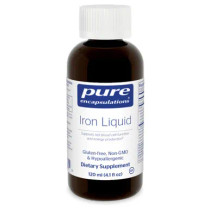Iron
Iron is a necessary mineral we need in order for our body to produce red blood cells. If you don’t get enough iron, you can’t produce enough red blood cells to keep you healthy. This is called iron deficiency anemia.
Most people will consume enough iron in their diet to meet the recommended daily allowance (RDA), however some people may need to take additional amounts for their specific needs. Things like bleeding problems, burns, hemodialysis, intestinal disease, stomach problems, stomach removal, and certain medications may increase one’s need for iron beyond the typical amount.
Symptoms that may present with low iron include fatigue/ tiredness, shortness of breath, decreased physical performance, and learning problems in either children or adults. It is also believed too low of iron could increase your chance of getting an infection.
Iron can be consumed in two ways: 1. Heme iron and 2. Nonheme iron. The best dietary source of absorbable (heme) iron is through lean red meat. Chicken, turkey, and fish are also sources of iron, but less so than red meed. Poorly absorbed (nonheme) iron can be found in cereals, beans, and some vegetables.








